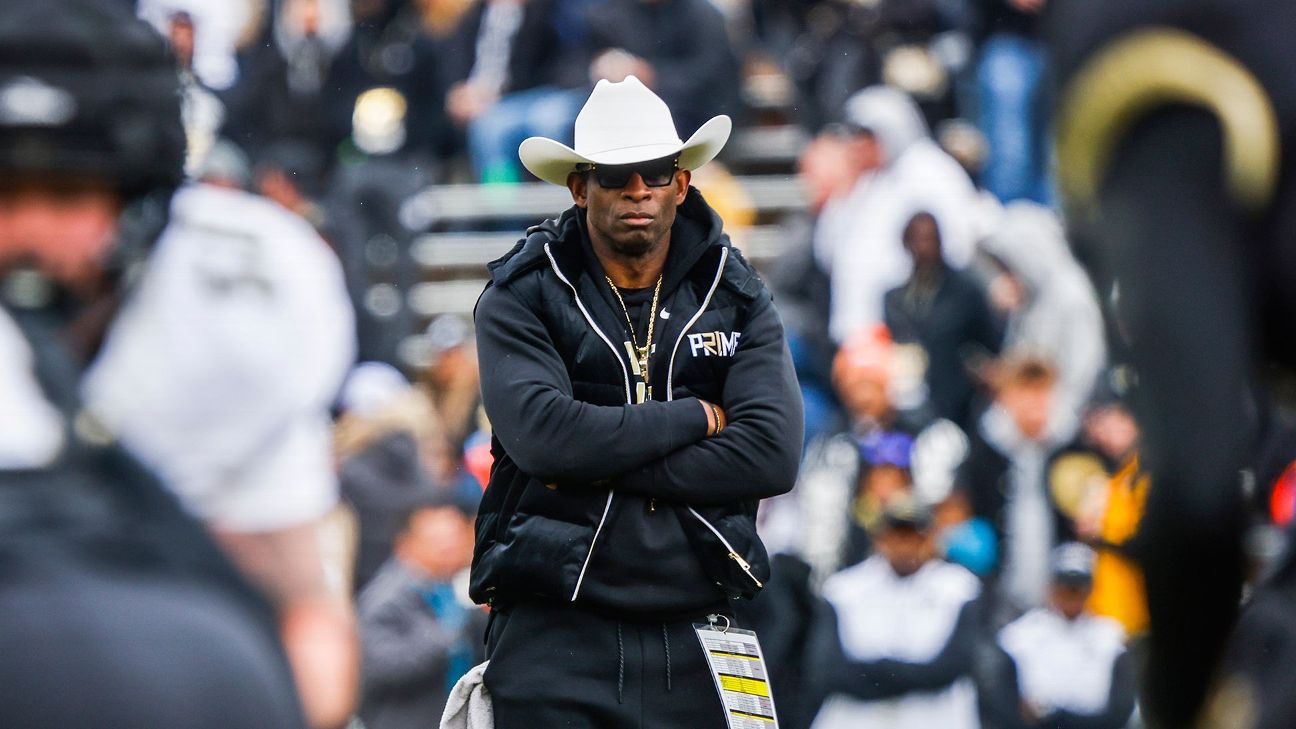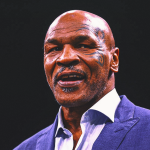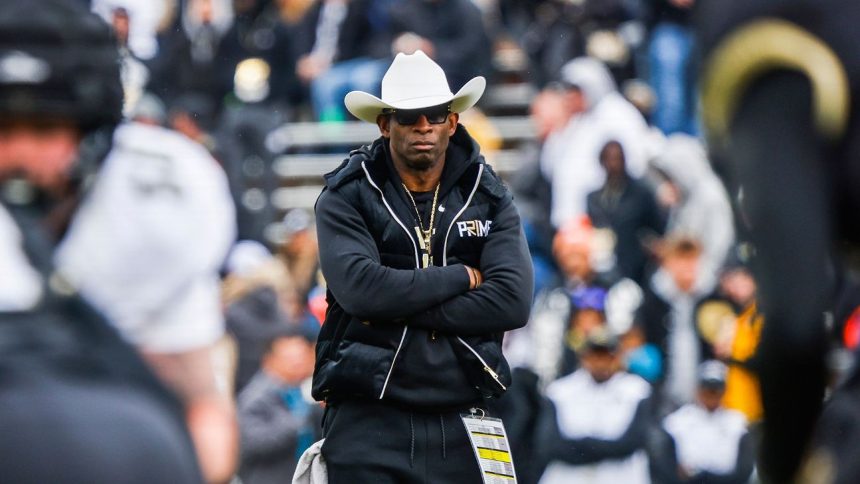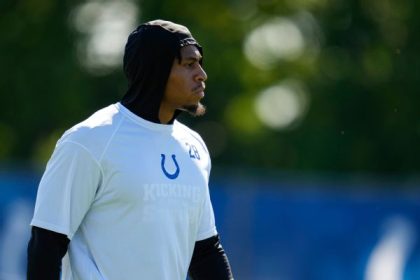
By Kyle Bonagura, Adam Rittenberg and Andrea Adelson
BOULDER, Colo. — In the midst of training camp, three weeks before the season opener, first-year Colorado coach Deion Sanders was in no mood to sing the virtues of building a strong team culture. In fact, he took exception to the idea that it was even necessary as part of his Rocky Mountain reclamation project.
“I’m not welcoming to that word, culture,” Sanders said. “That’s all I heard when I was in Jackson. Culture, culture, culture, culture, culture. Now culture, culture. What the heck does that mean?”
In this context, it was defined for the Pro Football Hall of Famer as creating an environment to become a good football team. For example, what little things do the players have to do every day to maximize their potential?
“I don’t think you got to have unity whatsoever,” Sanders said. “You got to have good players.”
Although that might partially defy conventional wisdom, it does sum up the blueprint from which Sanders has built his team over the past nine months. Since his splashy arrival in early December, hired after a successful three-year stint at FCS Jackson State, Sanders made it clear he planned to take advantage of college football’s now unrestrictive transfer rules to overhaul his roster — even encouraging holdover players to enter the transfer portal the first time he addressed the team.
He hasn’t wavered in his plan since.
The Buffs weren’t just one of the worst teams in college football last season, they were one of the worst teams in recent memory. Coach Karl Dorrell was fired after an 0-5 start in just his third season, and the team finished 1-11. Colorado lost games by an average margin of 29.1 points last year, the worst in the country and the fourth-worst among Power 5 programs in the past 30 years.
When the Buffaloes take the field in Fort Worth, Texas, against No. 17 TCU on Saturday (noon ET, Fox), the only resemblance to last year’s team will be the uniforms. Only 10 scholarship players from the 2022 roster remain with the team. The team’s 86 new players come from all over — from high school to junior college to the SEC — including nine who followed Sanders from Jackson State, led by Shedeur Sanders, Deion’s son and CU’s starting QB, and Travis Hunter, the No. 2 overall recruit in the 2022 class. According to ESPN Stats & Information data, it’s the most incoming players to an FBS roster since the inception of the transfer portal in 2018.
“I know it’s a huge overhaul,” Sanders said. “But it had to be done.”
No coach has ever been so brash about wanting to force out so many of the players he inherited. Even though it became easier in 2021 to transfer, once the rules had changed and players did not have to sit out for a season, the extent of Sanders’ undertaking is unprecedented in college football.
Colorado’s 53 incoming transfers — including roughly two dozen since the end of spring practice — is the most any team has ever added in an offseason.
Some coaches might have reservations about how this unorthodox approach could impact team chemistry, but Sanders could not care less.
“I don’t care about culture. I don’t care. I don’t care if they like each other, man. I want to win,” he said. “I’ve been on some teams where the quarterback didn’t like the receiver, but they darn sure made harmony when the ball was snapped.”
Sanders said that doesn’t mean his players don’t get along. He said there is plenty of evidence to the contrary. However, it does illustrate how his long professional playing career has influenced his priorities as he attempts to resuscitate a once-proud program.
“He understands the business,” a team source told ESPN. “If he doesn’t win, they’re going to get rid of him like they have the previous staffs, so you better be confident enough to make the moves you feel fit within the vision you have for that program. The one thing that no one can deny — you may agree or not agree with what he says — Deion Sanders has been a winner his entire life.”
After Colorado spent most of the past two decades mired in irrelevance, Sanders has put the school squarely in the spotlight. Historic numbers of players have transferred in and out. Season tickets are sold out. Merchandise sales have spiked, with sales of Colorado gear in December — the month Sanders was hired — up 505% over the previous year, according to the university. The Buffs have been one of the most talked-about teams in the country.
Now it’s time to play football.
ESPN spoke to several players who transferred after Sanders’ arrival, as well as current players and coaches, to find out what actually happened during the spring roster overhaul, what kind of a team Sanders is attempting to build and, ultimately, whether one of the most fascinating offseasons in the sport’s history will pay off.
On Saturday, April 22, the day after a spring snowstorm, nearly 50,000 people made their way to Folsom Field for Coach Prime’s first spring game. The crowd was bigger than at all but two of the team’s regular-season home games last season and marked the first time since the 1970s the school sold tickets to the event.
“This was the beginning of everything in the direction that we go right now,” Sanders said afterward. “You all know that we’re going to move on from some of the team members and we’re going to reload and get some kids that we really identify with. This process is going to be quick, it’s going to be fast, but we’re going to get it done.”
The Sunday and Monday after the spring game were uncomfortably quiet around the UCHealth Champions Center, headquarters of the Colorado football program. Players had been summoned to meet with their position coaches and, in some cases, Sanders as well.
They came and went, some never to return. Sanders’ proclamation at the Buffaloes’ first team meeting back in December — “I want y’all to get ready to jump in that portal” — had gone into full effect, just a bit later than many had expected.
Former Colorado linebacker Mister Williams remembered entering a mostly empty building for a Sunday meeting with Sanders and linebackers coach Andre’ Hart. The coaches reviewed Williams’ performance and told him he ultimately didn’t fit with the direction Colorado wanted to go.
“Coach Prime asked me, do I know what that means?” Williams said. “Like, do I know what I need to work on so that whenever I do find a new place, that won’t be an issue?”
Williams, who originally had no intention of transferring from Colorado, mostly listened during the meeting. He thanked the coaches for the opportunity as they parted ways. He then went to the locker room and gathered his things. He eventually transferred to the University of the Incarnate Word.
“Some people, they don’t plan on transferring the whole time that they’re in college,” said Jason Oliver, who transferred from Colorado to Sacramento State after the spring game. “The fact you can get cut like that, it kind of sucks, but that’s what college football is nowadays. It’s just a business, so you’ve got to start to understand it.”
Wide receiver Jordyn Tyson led CU in receiving yards, receiving touchdowns and total touchdowns in 2022 before sustaining a season-ending knee injury in early November that required surgery. He had spent the winter and spring rehabbing, which limited his interactions with Sanders and the new coaching staff. But Tyson planned to stay and remain a significant contributor, until his meeting with Sanders and wide receivers coach Brett Bartolone.
“I just wasn’t wanted, basically,” Tyson said. “They basically said that.”
It was harsh, like an NFL cutdown day, except it was cuts of players who mostly arrived in Boulder under the assumption they had a home until they exhausted their eligibility. Their scholarships would have been honored if they wanted to remain at CU as students, but the whole process came across as impersonal, multiple players told ESPN. If the initial wave of more than two dozen incoming transfers before spring practice was Phase 1 of Sanders’ transformation, Phase 2 commenced during the post-spring-game exit interviews.
“Sometimes when you’re telling somebody what they want to hear, it is worse than just telling people the truth,” said Colorado defensive coordinator Charles Kelly, who joined Colorado in December after four years on staff at Alabama. “The one thing that [Sanders] firmly believes in is he’s going to tell people the truth. He has not done anything since he’s been the head coach that he didn’t say he was going to do. He spelled it out exactly what his plan was.”
Sanders might say he doesn’t care about culture, but his coaching philosophy is built on the same core principles he learned as a player at Florida State under Bobby Bowden and defensive coordinator Mickey Andrews.
In an interview last year with ESPN’s Stephen A. Smith, Sanders said, “I’m pretty much a version of Mickey Andrews right now, the way I go about my job.”
He made similar comments to The Ledger newspaper when Andrews retired in 2009: “Not a day goes by when I am coaching, mentoring or teaching somebody that I don’t use things coach Andrews taught me. He is one of the all-time great defensive coaches in college football history.”
Andrews spent 26 years as defensive coordinator with the Seminoles, and he molded Sanders into a two-time All-American in 1987-88. Andrews’ relentlessness with his players, tough love, and emphasis on hard work and discipline are core tenets Sanders has taken with him as a coach. Andrews told ESPN from his home in Tallahassee, Florida, that he and Sanders have talked at length about their similar approach to coaching.
“He has told me a lot of times that he finds himself repeating some of the language I used, and the way I went about talking with players and trying to challenge them,” Andrews said. “Deion is a very honest person. I tried to be the same way with the players. I was tough on them, and I understand he is. I tried to create self-discipline. That’s how you become disciplined. You have to take ownership of that.”
Andrews said the first team meeting Sanders held at Colorado — when he sent an eye-opening message about his expectations — reminded him of his freshman year at Alabama under Paul “Bear” Bryant in 1959.
“I saw the players were sitting around expecting a guy to come in there being jovial. He pinned their ears to the wall right off the bat,” Andrews said. “It reminded me so much of Coach Bryant. His deal was you get in or you get out. He wasn’t going to have a meeting and try to encourage you to join his team. He told us the first step to winning is to keep from losing, and he said you guys in here that can’t abide by that need to find another place to go to school. He was going to force you to make a decision. Deion kind of did the same thing.”
Sanders often points to five qualities he’s looking for in his players: smart, tough, fast, disciplined, great character. Those close to Sanders describe an approach that prioritizes similar qualities that Bowden valued while building Florida State into a national power, but Sanders has taken full advantage of modern NCAA rules.
First-year head coaches, like Sanders, have access to the NCAA’s “Aid After Departure of Head Coach” rule, which allows them to cut scholarship players and not have them count against the 85-scholarship limit, as long as those players remain on scholarship through the university. The transfer eligibility rules that went into effect in 2021 allowed this to become a mechanism for clearing roster space. Additionally, the NCAA Division I Council last year announced a two-year waiver for initial counter limits, which previously capped the number of incoming scholarship players — high school recruits and transfers — in the offseason at 25. These rules make it possible for Sanders and other first-year coaches to revamp their rosters in ways they couldn’t before.
For a losing program like Colorado, Sanders’ approach, while callous to some, is a welcome change for others. Former Colorado and NFL offensive lineman Matt McChesney trains college athletes in a gym near Denver, including about 10 former Colorado players who transferred in the offseason. He welcomes the “unapologetic” and “business-related” approach Sanders has taken so far at his alma mater.
McChesney admitted Colorado’s offseason overhaul included some players the team wanted to keep but said some of the negative feedback — with criticism from other college football coaches and from those in the media — was misplaced.
“I don’t have an issue with what he did at all. In fact, I dig it and I hope he does more of it,” McChesney said. “Honestly, I want it to be as cutthroat as humanly possible. I want everybody walking on eggshells. I want guys to fear for their jobs, so they do it at a high level. The perception that somehow this is dirty, I don’t understand how people can feel like that.”
McChesney attributes Colorado’s decline to a less-demanding environment and not living up to the words that came to define the program.
“It’s embarrassing when people in the state look at the logo and they’re like, ‘Hey, you should be in the Mountain West,'” McChesney said. “So the fact that he’s brought the pride back to the university when our motto is ‘The pride and tradition of the Colorado Buffaloes will not be entrusted to the timid or the f—ing weak,’ it resonates.”
Receiver-turned-tight-end Mikey Harrison is one of the 10 scholarship players returning from last season. As some teammates talked of transferring after the coaching change, Harrison was convinced he wanted to stick it out.
“I knew he was going to bring guys here, and to me, I’ve always believed in myself and believed in my abilities on the field,” Harrison said. “I even thought, this is one of the greatest football players of all time. … I feel like he’ll be able to see my ability.”
Harrison’s exit interview went better than many other returners, and he went into the summer believing he had a good shot at playing time this fall. Still, it marked a kind of awkward transition as many close friends departed.
“It kind of sucks in the moment. You build relationships with the guys you’ve been here with forever and then you see ’em go,” Harrison said. “Some guys are ending up in better positions for themselves, which obviously as a friend and as a teammate, that’s what you want for them.
“And then the guys coming in, like any other team, you just embrace them because you know that these are the guys you’re going to go play with on Saturday. There’s no other option but to accept them and embrace into our team and into our community at CU.”
For the incoming players, like former Florida State defensive back Omarion Cooper, the opportunity to head to Boulder was similar to signing as a free agent for an expansion team. They weren’t transferring to play for a team that just went 1-11. That team no longer existed. They were signing up for the chance to play for one of football’s all-time best players as he built a team from scratch.
Cooper didn’t arrive until after spring practice. It wasn’t ideal timing given all the missed reps from the spring, but there’s a confidence that comes from having played major college football that eases the learning curve.
“It was a little challenging [coming in late], but having that college experience, being through workouts and stuff like that, you kind of know what to expect,” he said. “So, it was a little challenging, but we got adjusted pretty well.”
Given all the moving pieces, it might be hard to get a firm grasp on what the Buffaloes’ season will look like. But expectations are not high. They are projected to finish second to last in the conference, with Las Vegas odds ranging from +5,000 to +15,000 to win the conference in their last Pac-12 season before the Buffaloes return to the Big 12.
“I really don’t even too much care about that,” quarterback Shedeur Sanders said at Pac-12 media day. “Because that’s what [the media are] supposed to do. They’re supposed to hype things up and create chaos. That’s what media is.”
Of course, the Buffs haven’t won a conference title since 2001. The old way decidedly wasn’t working.
So Colorado is trying something different — something that has never been done in the modern history of the sport. It took a perfect storm of a one-of-a-kind coach, an overhaul of NCAA rules and a program desperate for respectability.
Will it work this year? Will it work at all?
That might be impossible to say right now. But either way, don’t expect Sanders to assign credit or blame to the team’s culture. That’s not what scores points or makes tackles.
ESPN reporters Tom VanHaaren and Mark Schlabach contributed to this story.












